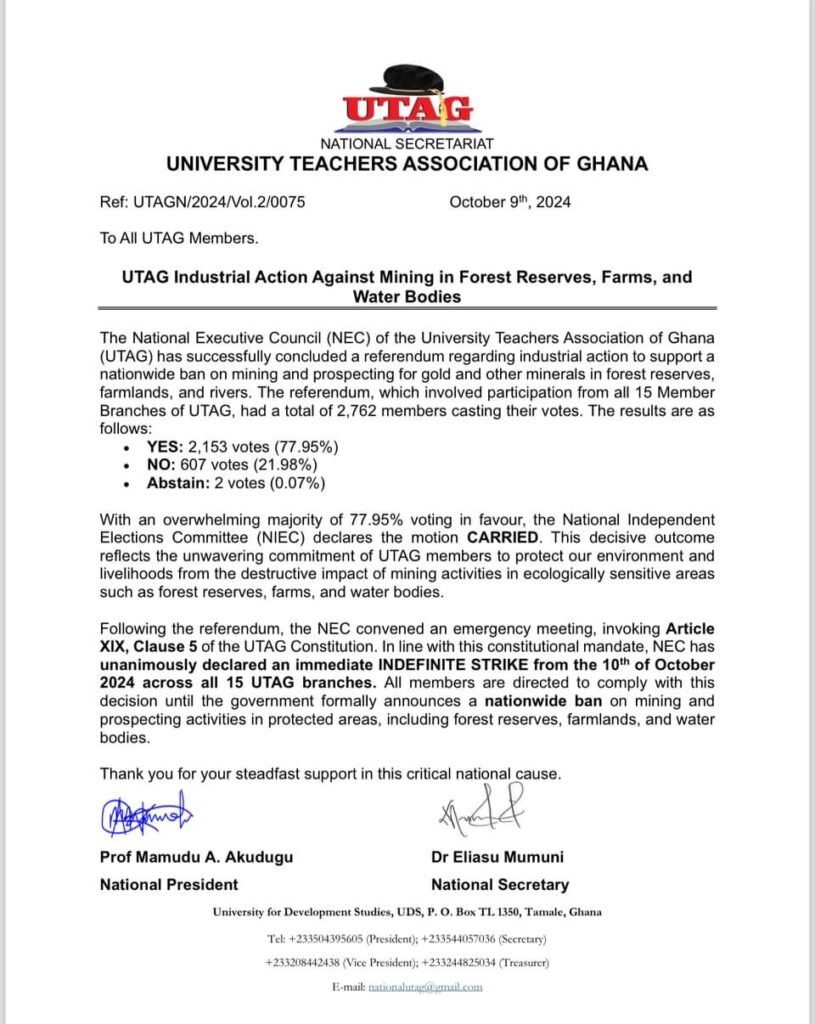Business
UTAG proceed with strike, demand nationwide ban on mining in forest reserves

The University Teachers Association of Ghana (UTAG) has decided to proceed on an industrial action despite Organised Labour’s suspension.
The Organised Labour on Wednesday, October 9, in a meeting disclosed that they have suspended their intended strike action commencing today, October 10.
However, UTAG, after a crucial meeting yesterday, decided to proceed with the strike demanding a nationwide ban on mining in forest reserves.
In a statement issued yesterday, October 9, “National Executive Council (NEC) of the University Teachers Association of Ghana (UTAG) has successfully concluded a referendum regarding industrial action to support a nationwide ban on mining and prospecting for gold and other minerals in forest reserves, farmlands, and rivers.”
They added, “The referendum, which involved participation from all 15 Member Branches of UTAG, had a total of 2,762 members casting their votes. The results are as follows: YES: 2,153 votes.”
By Edem Mensah-Tsotorme
Read the full statement below
Business
Fearless Fund launches Ghana Microfinance Fund …offers GH¢100,000 pitch prize

As part of the launch of its newly announced Microfinance Fund in Ghana, Fearless Fund is hosting a pitch competition for women entrepreneurs operating in the fast-moving consumer goods (FMCG) sector. This will offer one standout founder the opportunity to secure GH¢100,000 in growth capital.
The pitch competition forms part of Fearless Fund’s broader expansion into Africa. It reflects the firm’s commitment to creating practical, accessible pathways for women entrepreneurs to scale their businesses and build long-term wealth.
The competition is targeted at women-led FMCG businesses, including those involved in trading, production, packaging, distribution, and retail sectors that play a critical role in everyday commerce yet remain significantly underfunded despite their economic importance.
“Women across Africa are building resilient, high-impact businesses, yet they continue to receive only a fraction of the capital needed to grow,” HM Queen Wa Arian Simone, CEO and Founding Partner of Fearless Fund, said in a statement issued in Accra yesterday.
“This pitch competition is about visibility, access, and possibility, ensuring women entrepreneurs have the opportunity to compete, scale, and lead,” she added.
In addition to the competition, the statement said the Fearless Microfinance Fund would provide microfinance loans ranging from GH¢10,000 to GH¢30,000 to women entrepreneurs in Ghana, offering catalytic capital to support business expansion, inventory growth, improved distribution, and market access.
“Alongside its focus on supporting women entrepreneurs, the Fearless Microfinance Fund also presents an opportunity for social-impact-focused investors to participate in inclusive economic growth. Investors can secure a guaranteed 10 per cent annual rate of return through the fund, aligning financial performance with measurable social impact,” the statement added.
According to Fearless Fund, the pitch competition represents more than a single funding opportunity; it is part of a broader strategy to spotlight women entrepreneurs who are ready to scale and to support the next generation of African wealth creators.
The pitch competition will take place as part of the official launch activities for the Fearless Microfinance Fund in Ghana. Women entrepreneurs who are ready to scale are encouraged to apply and participate. Interested participants can explore access to the Fearless Microfinance Fund by visiting the company’s website.
HOW TO APPLY
Women entrepreneurs who are ready to scale are encouraged to apply for the pitch competition and explore access to the Fearless Microfinance Fund by visiting https://www.fearless.fund/africa
For more information on Fearless Fund, the Fearless Microfinance Fund in Ghana, and ongoing updates, visit https://www.fearless.fund/africa or follow Fearless Fund on Instagram, Facebook, and LinkedIn
BY TIMES REPORTER
Follow Ghanaian Times WhatsApp Channel today. https://whatsapp.com/channel/0029VbAjG7g3gvWajUAEX12Q
Trusted News. Real Stories. Anytime, Anywhere.
Join our WhatsApp Channel now! https://whatsapp.com/channel/0029VbAjG7g3gvWajUAEX12Q
Business
Fearless Fund expands to Africa…launches Microfinance Fund in Ghana

fearless fund, the world’s first venture capital firm built by women of colour for women of colour, and a global leader in economic inclusion, has announced its official expansion into africa with the launch of the Fearless Microfinance Fund in ghana.
this launch marks a significant step in advancing Fearless Fund’s mission to close the global wealth gap by improving access to capital for under-resourced women entrepreneurs.
the fund is structured to bridge this gap through microfinance loans ranging from GH¢10,000 to GH¢30,000, targeted at underserved women-owned businesses, while systematically measuring social impact across job creation, geographic reach, digital inclusion, and support for first-time borrowers.
“expanding our mission to africa has always been central to closing the global wealth gap,” her majesty queen wa arian simone, chief executive officer and founding partner of Fearless Fund said in a statement issued by the company in accra on friday. “africa represents the world’s most dynamic economic frontier. our presence in ghana is about ensuring women entrepreneurs across the country have access to the capital they need to build, scale, and sustain successful businesses. fearless fund is a beacon of what’s possible when women of colour lead with vision and power,” she said.
ghana represents a critical entry point for Fearless Fund’s african expansion. while the country ranks first globally with 46.4 per cent of businesses owned by women, women-led enterprises continue to earn an average of 34 per cent less profit than male-owned firms due to persistent financial, social, and structural barriers.
globally, Fearless Fund has delivered measurable impact, having raised multiple eight-figure venture capital funds with average cheque sizes ranging from $500,000 to $2 million, secured a historic $240 million debt facility to expand access to capital for under-resourced entrepreneurs, and awarded more than $5 million in non-dilutive grants to women of colour founders/entrepreneurs across the united states and globally.
its get venture ready (GVR) programme has equipped over 1,000 women with investor-readiness training, mentorship, and tools to scale sustainable businesses.
fearless fund is backed by leading global institutions, including bank of america, jpmorgan chase, paypal, costco, and mastercard, and its work has been recognised by major international media outlets such as CNN, Bloomberg, the wall street journal, and Forbes.
“beyond the united states, Fearless Fund has established a growing global footprint, deploying millions of dollars into startups across africa, australia, and canada, awarding grants through ecosystem partners in countries including côte d’ivoire, ghana, and botswana, and educating over 200,000 entrepreneurs through its partnership with Trace Academia Africa,” the statement said.
the launch of the Fearless Microfinance Fund will be supported by a series of engagement and activation initiatives to empower women entrepreneurs and strengthen ghana’s entrepreneurial ecosystem.
“to be the first to receive updates on the Fearless Microfinance Fund in ghana, upcoming initiatives, and opportunities for women entrepreneurs, follow Fearless Fund on instagram, facebook, and linkedin,” the statement said.
By Times Reporter














